
5 min read
There are 30 professional basketball teams in the NBA. Among these teams, the average player age varies quite a bit. According to Basketball Refererence, the Phoenix suns had the youngest team last season with an average player age of just 23.7 years old. Conversely, the Cleveland Cavaliers had the oldest team with an average player age of 30.6 years old.
Here’s a look at the average player age for each team last season:
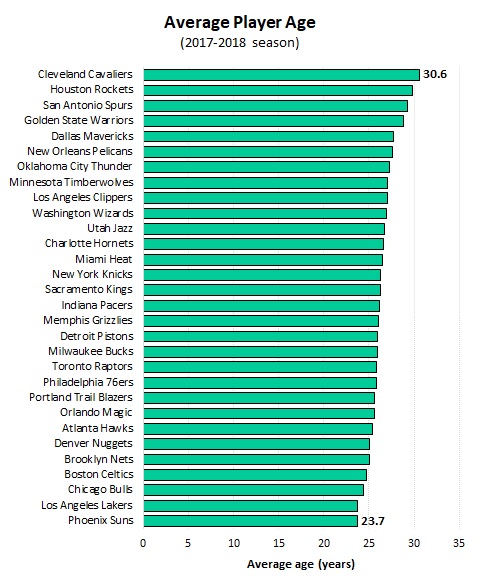
It’s no secret that there are pros and cons to having older players on your team. On one hand, older players are more mature, more experienced, and are less likely to get rattled in high-pressure situations. On the other hand, they may be unable to keep up with younger, more athletic opponents.
If you had to guess, do you think teams with older players won more or less than teams with younger players last season?
To answer this question, I gathered data on the total number of wins for each team last season and merged this with the data on average player age. Then I made a scatterplot with average player age on the x-axis and total wins on the y-axis for each team:
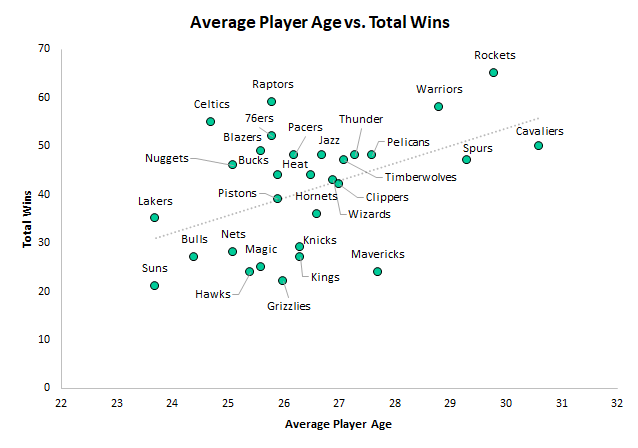
There’s a pretty clear pattern: in general, teams with older players won more games.
Of course, there were exceptions. For example, my beloved Dallas Mavericks had the fifth oldest team in the league last year, yet only won 24 out of 82 games. On the flip side, the Celtics had the fourth youngest team and managed to win an impressive 55 games:
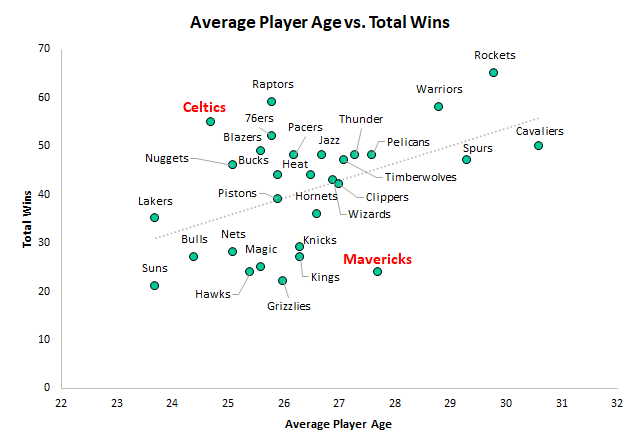
In general, though, older teams won more games than younger teams.
To quantify the relationship between average player age and games won, we can use a metric known as a correlation coefficient, which measures the strength of a relationship between two variables.
A correlation coefficient can range from -1 to 1, with -1 indicating that two variables are perfectly negatively correlated, 0 indicating that two variables have no relationship, and 1 indicating that two variables are perfectly positively correlated.
It turns out that the correlation between average player age and games won is 0.48, which is a pretty strong positive relationship. When average player age increases, total team wins tends to increase as well.
In addition to measuring the relationship between average player age and total team wins, we can find the correlation between other interesting variables too. For example, is average player age correlated with true shooting percentage and turnover rate?
True shooting percentage: a measure of shooting efficiency that takes into account 2-point field goals, 3-point field goals, and free throws. You want this number to be high.
Turnover rate: number of turnovers committed per 100 plays. You want this number to be low.
To answer this, I downloaded data on true shooting percentage and turnover rate and created what is known as a correlation matrix, which shows the correlation between different variables in a neat matrix:

It turns out that player age is positively correlated with true shooting percentage and negatively correlated with turnover rate. Older teams tend to shoot the ball more efficiently and turn the ball over less.
A correlation matrix is a neat way to visualize data because you can easily understand the relationship between different variables just by looking at a matrix. And just like we can create this visual for NBA data, we can do the same with personal finance data.
The Personal Finance Correlation Matrix
In personal finance, some variables that impact your financial goals include net worth, age, education, experience, skills, income, expenses, investment returns, self awareness, and gratitude.
Using these variables, we can create a personal finance correlation matrix:
Note: the numbers in this matrix are purely made up, but are useful in illustrating a few concepts.
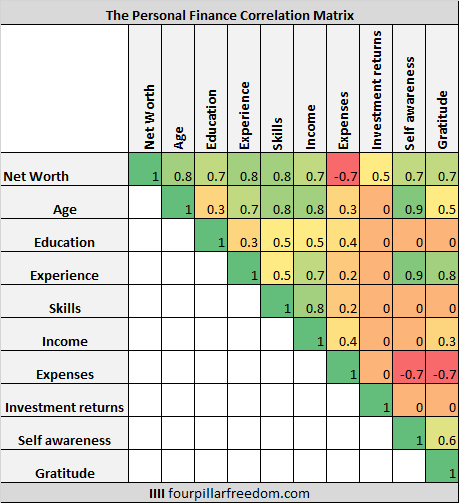
A few notes on this matrix:
Income is positively correlated with net worth, but not perfectly positively correlated. People who have a high income typically have a higher net worth as well, but not in all cases. A high income can always be offset by high expenses.
Age is positively correlated with income, but not perfectly positively correlated. The older you are, the higher your income in most cases. In a recent analysis on the income of Americans by age, we saw that the median annual income for 25-year-olds was $29,625.
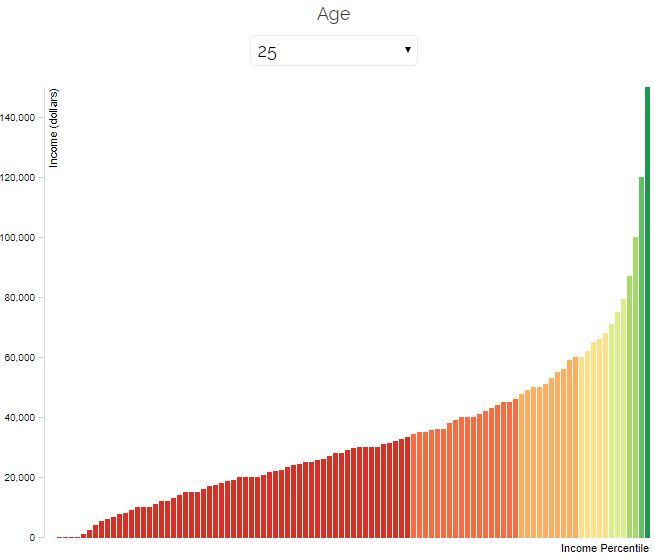
By comparison, the median annual income for 45-year-olds was $46,242.
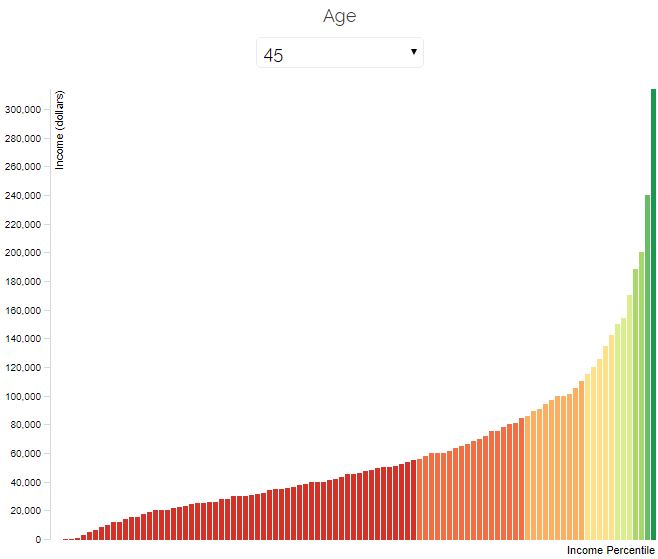
As you get older, your income tends to increase due to more education, more skills, and more experience, which allows you to charge more for your time and your work.
However, there are plenty of people who are able to build up their skills and education in their 20s and earn a high income while they’re still young. Likewise, there are plenty of people in their 40s who earn far less than $46,242 per year due to lack of skills, lack of education, and a myriad of other factors.
More self awareness is correlated with lower expenses. As Carl Richards wrote in The Behavior Gap,
“Whatever you have to do to gain self-knowledge, do it. Find out who you are and what you want. Then you can stop wasting your life energy and your money on stuff that doesn’t matter to you.”
When you know what activities bring you joy, what type of work gives you meaning, and what type of people give you energy, you can spend more time pursuing those things rather than wasting your energy and money on stuff that doesn’t matter.
More gratitude is also correlated with lower expenses. When you’re grateful for the things you already have – running water, electricity, shelter, food, a refrigerator, air conditioning, good health, family, and friends – you suddenly find that you don’t need to spend money on stuff to feel good. You likely already have everything you need.
And once you feel that you have everything you need, you suddenly feel rich. As Seneca once said:
“It is not the man who has too little, but the man who craves more, that is poor.”
Conclusion
Merely practicing gratitude won’t make you rich. Likewise, developing self-awareness won’t make you rich. Nor will an impressive skill set, a college degree, or a boatload of experience. But once you get several of the factors in the personal finance correlation matrix working in your favor, becoming rich almost becomes inevitable.
- The Ad Revenue Grid - August 6, 2021
- Attract Money by Creating Value for a Specific Audience - July 13, 2021
- The 5-Hour Workday - March 26, 2021
Full Disclosure: Nothing on this site should ever be considered to be advice, research or an invitation to buy or sell any securities, please see my Terms & Conditions page for a full disclaimer.

Last year was rough for our Mavs, this year has been SOO much better. Love watching Luka!
Luka is so fun to watch this year. He might even be able to carry us to the playoffs. Fingers crossed!